Today is the first article in our new series of Band Tips, every Wednesday we will be posting a new article of Band Tips to give you tips on all positions of the band and to help you run your band.
The first two weeks are all about Drum Majors. So firstly a drum major or field commander is the leader of a marching band, drum and bugle corps, or pipe band, usually positioned at the head of the band or corps. The drum major often holds the responsibility to keep the band organised and structured. Heres 7 thing you should be doing;
#1 A good Drum Major is early

To be early is to be on time. To be on time is to be late.
As much as I hate being late, I don’t even like just being “on time.” If I’m exactly on time to an event, a class, a rehearsal, I feel like I’ve lost an opportunity to take a breath, to get my bearings, to get my head in the game.
Olympic divers don’t just run up the ladder and fling themselves off the board.
They pause, breathe, center themselves—they look to make sure there’s water in the pool—all of which helps them lessen the possibility of things going badly wrong.

When you arrive somewhere early, you give yourself the time to prepare one last time, and the chance not to seem flustered right out of the gate.
You never get a second chance at a first impression. A good drum major tries to be early whever possible.
#2 A good Drum Major is supportive

Show support for others before they show support for you.
We’ll score points with our bands (in fact, with anyone) when we make the effort to take care of them, to listen to them, to thank them for their work, to treat them kindly, without their having asked for such.
But more than “scoring points,” this is really about creating a positive atmosphere.
This can be hard sometimes, because people don’t always agree on everything all the time.
But if we’re supportive of others, consistently, in a sustained way – without maintaining a mental scoreboard, but just because it’s a constructive way to operate – the someone will benefit.
Who benefits?
It may be the whole band, because they appreciate the support and finally grasp why we were being such smiling, helpful people all the time.

Or at the very least, YOU may feel better, because whether things work out or they don’t, you know we’ve done everything you can do to build people up rather than breaking them down.
A good drum major works to create a positive environment. Speaking of being positive:
#3 A good Drum Major is enthusiastic

Make sure you love what you’re doing—whether you like it or not.
While we’re on that subject – look alive! Stay awake! Be alert! Be on—all the time.
No one is like that 24/7. No one. But we’ve got to keep our down moments—our exhaustion, our dismay, and our bad moods—tucked away in places and times where our bands can’t see them.
Drum majors are always “on stage.”
Not feeling it? Fake it.
If the leader of any group is operating at 100%, that group will probably reflect that energy back at about 70%.
By the laws of intergalactic band math, if you want your group to be at the absolute top of their game, you have to be at 143%.
Let’s put it another way:
You can fake energy, but not passion.
Just about everyone has a “BS-meter.” It’s how you can tell when someone’s being straight with you or if they’re joking or lying.
If you’re not putting everything you have into your job while you’re in front of our bands, THEY’LL KNOW.
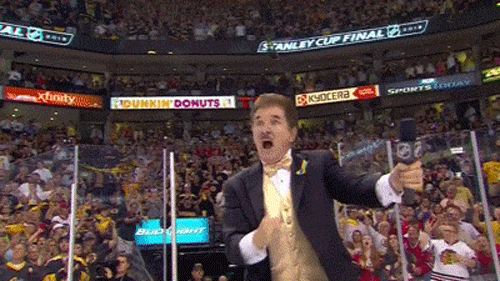
But, consider this:
Why did you get into band in the first place? Why did you stay in? Why do you still keep at it?
Chances are pretty good that you looked forward to becoming drum major because you just LOVE the activity.
That’s all it takes. A good drum major shows their love for the activity.
#4 A good Drum Major is an example
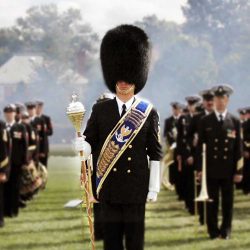
You are a leader. Act like it.
How can we get people to love band if we don’t appear to love band? How can we expect people to behave responsibly if we’re not willing to?
Do we want our bands to be enthusiastic? To listen to the director well? To put everything they have into everything they do?
Then we simply CAN’T NOT do those things. And, as we said in #3, at least 43% more than the rest of the band!

How do you wish your band would be?
We’ve said it in lots of different ways, but it really is about being the first one to hit the field and the last one to leave.
It’s about doing what needs to be done, when it needs to be done, whether you like it or not.
And lots of times, it’s about figuring out what needs to be done before anyone has to tell you.
A good drum major thinks ahead. Speaking of which:
#5 A good Drum Major is prepared
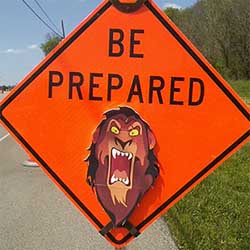
If you fail to plan, plan to fail.
Be ready. Study the scores. Practice conducting the scores. Know the instrument part cold, if you’re one of those DMs who marches and plays a tune or two.
Study the drill pages. Look for the challenging drill moves that may need extra effort to teach or clean.
Expect the unexpected…ahead of time
Imagine things that the director MIGHT ask for ( “can you work with the percussion?” “can you teach this new member to march in about five minutes?”) and figure out ways to do them in a way that people wouldn’t guess that the whole thing was improvised.
Imagine what emergency might happen during a parade, pregame, or competition and you`d be the one to figure out what you could do to make your band feel like there’s someone competent and caring getting them through it.
A good drum major does their homework. Speaking of which:
#6 A good Drum Major is professional

You’re still a kid. It’s ok to act like one. Just not during band time.
In fact, if we’re wearing band swag or anything that links us to our organizations, we need to consider how professional we may need to look.
Other people don’t care that it’s not “band time.” You represent your band, even when you’re not officially on the clock.
What should the audience say about your band?
So, in or out of rehearsal, in or out of uniform, let’s be classy. Let’s be dignified. Let’s be positive. Let’s show good judgment and taste.
Let’s avoid letting our personal lives interfere with the jobs we need to do. Let’s use tact—”the art of making a point without making an enemy.”
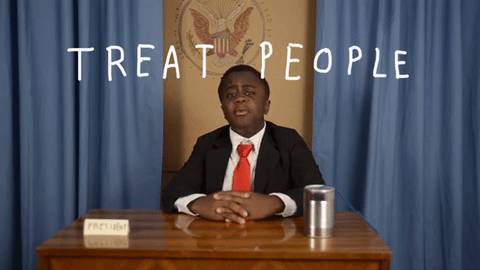
Let’s praise in public and critique in private, and even then, be decent about it. And even though drum majors get attention almost constantly, let’s be sure we’re getting it for the right reasons.
Let’s remember that we’re always on stage and always being evaluated on how well we help our bands, rather than how good we look in our uniforms.
A good drum major acts the part all the time.
#7 A good Drum Major is a servant
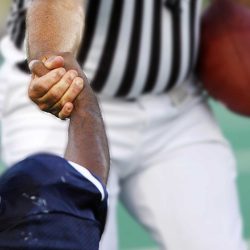
Leaders serve.
This is something that people who have held elected office throughout our history have occasionally forgotten: they’re in public service for a reason. They’re serving the public.
Now, it’s not a title we imagine announcing from the press box: “Band servant Juan Smith, is your band ready?” “The color guard is served by Bess Mason.”
But that’s probably how our brains should translate it.
It’s so much more than conducting
A drum major is a role model, a friend, a mediator, a teacher, a protector. Part of our job is to make sure that the scared freshman doesn’t quit before the end of band camp. Part of it is to make sure the upperclass marchers help us to keep the band moving forward.

And part of our job is to lead people in ways that don’t look like standing-on-the-podium, commanding-the-block, deep-bows-at-the-end-of-the-tune.
Sure, DMs do those things too. But that’s the easy stuff. Serving is much more important.
A good drum major puts the needs of the group before their own.
Next week we will be looking at how drum majors can improve themselves. If you have any ideas you think we should use please send us a message on Facebook or below;

[…] Following on from last weeks band tips we pick up on the same topic only this time were looking at how our drum majors can improve themselves; […]